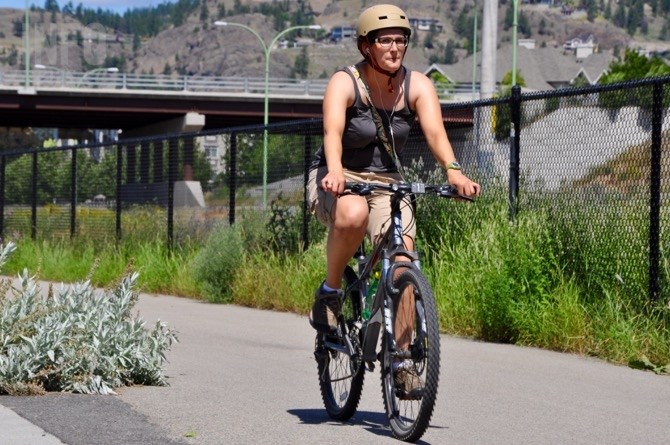
A woman cycles on the Rail Trail multi-use path near Spall Road.
(JOHN MCDONALD / iNFOnews.ca)
June 07, 2016 - 4:30 PM
PROVINCE SIX YEARS BEHIND IN PROVIDING GREENHOUSE GAS EMISSIONS DATA
KELOWNA - Reducing greenhouse gas emissions is one of the goals stated in Kelowna’s official community plan but a lack of data from the provincial government means how close the city is to reaching that goal is unknown.
“It’s a little bit frustrating,” sustainbility coordinator Traci Guidi admits. “Having the number would be nice to have as it would show where our progess would be.”
Guidi was before city councillors last week detailing the myriad of greenhouse gas reduction projects the city completed in 2015 as part of the climate action revenue incentive program.
It allows municipalties which have signed on to the B.C. climate action charter to get back as much as 100 per cent of the carbon taxes paid to the provincial government.
This year, Kelowna is claiming a rebate of $228,000 based on the total amount of greenhouse gas reductions from projects ranging from a boiler upgrade to the Rutland Arena to the planting of 8,000 ponderosa pine seedlings in some of the city’s parks.
While the reductions of each project can be measured, baseline data for the city’s greenhouse gas emmissions was last provided by the province in 2010, leaving Guidi and the rest of the city in the dark about the sum total of their efforts.
Now six years behind in providing data, the province again recently pushed back the possible delivery date to next fall, Guidi says.
“We have complained to the province. We ask them every time we see them,” Guidi says. “We know there are other municipalities in similar boats as well.”
As a charter signatory, Kelowna pledged in 2007 to reduce community greenhouse gases by 33 per cent by 2020 and gases caused by corporate operations by 22 per cent by 2017, goals the city has long since modified downward.
Last year, corporate emissions were down just one per cent from 2007 and community emissions were down two per cent, as measured against the data from 2010.
Guidi says the majority of emissions-reducing projects would have gone ahead anyway for other reasons.
“There’s no project that I can think of that we haven’t done because of the missing data,” she says. “It would be nice to have but it hasn’t stopped us from moving ahead.”
Where the data will become critical, Guidi says, is when the city begins updating the official community plan in late 2017.
To contact a reporter for this story, email John McDonald or call 250-808-0143 or email the editor. You can also submit photos, videos or news tips to the newsroom and be entered to win a monthly prize draw.
We welcome your comments and opinions on our stories but play nice. We won't censor or delete comments unless they contain off-topic statements or links, unnecessary vulgarity, false facts, spam or obviously fake profiles. If you have any concerns about what you see in comments, email the editor in the link above.
News from © iNFOnews, 2016